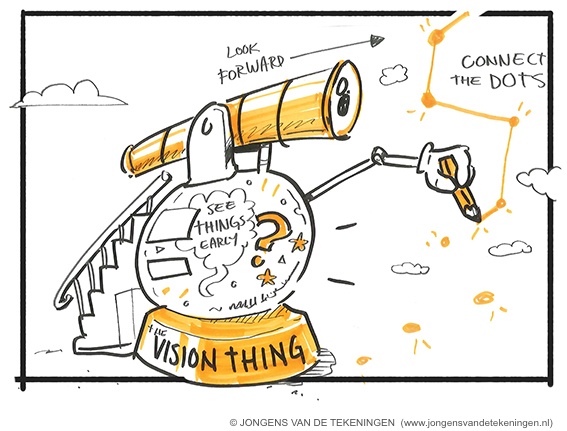Thought Leadership

In my work I complement my interest in strategic subjects such as vision, decision making and innovation, with concepts, theories and lessons from the fields of psychology, social sciences, the performing arts and the narrative and linguistic sciences. This multi-disciplinary approach not only satisfies my personal curiosity, it also produces ideas I wouldn’t have realized if I had maintained within the traditional, analytically-oriented boundaries of strategy.
Often these come together under the heading of leadership. After all, these strategic exercises are performed by humans and led by leaders, so understanding the human dynamics in intellectual subjects is in my view essential. In some domains therefore, I dare to claim thought leadership.
- In particular, the area of vision development, and taking vision as a developmental concept, has largely been unexplored terrain, and my thoughts – laid out in the book Anticipate – fills the gap and provides guidance to leaders who aspire to grow their visionary capacity. This is a truly multi-disciplinary approach, combining all the above-mentioned fields
- In addition, the proprietary method FuturePriming offers a very new approach to productively engage with the future and become better at the skill of “seeing things early”. Combining strategic foresight with the psychological priming phenomenon creates a highly impactful, fresh method.
- Thirdly, what marks the difference between a true visionary from a narcissist? I became fascinated by this question after reading Steve Jobs’ biography. Clearly visionary in some way, but extraordinary dogmatic, self-absorbed, unstable and unpleasant in many others; all things I consider detrimental to developing your visionary capacity. Becoming exposed to the invaluable work of Dr Michael Maccoby on narcissism, provided the direction to develop a framework that distinguishes narcissists from true visionaries.
- Lastly, the area of visionary communication (although seemingly not new) has my passion, and I believe that the thoughts and ideas contribute to more powerful and inspirational communication, there where your story has to overcome the inherent difficulties of engaging with the future.

